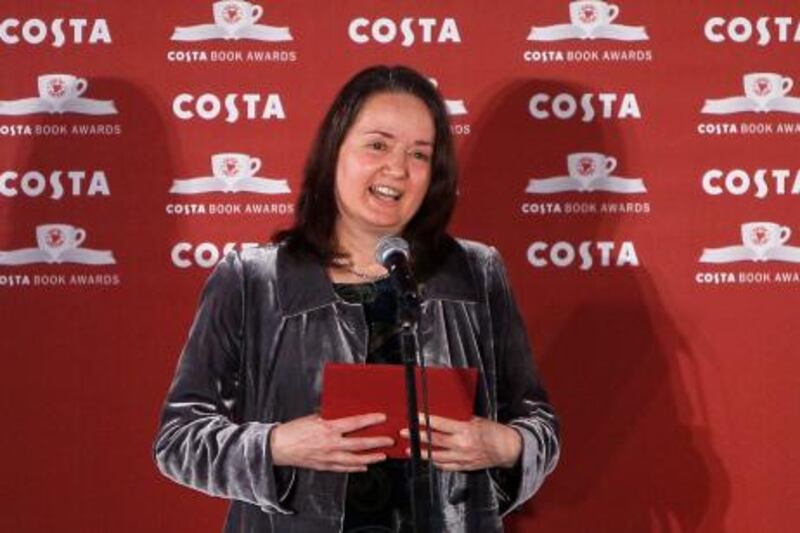The Costa Book Awards is the literary prize that continues to surprise – despite a winning book that Andrew Neil, the chairman of the judges, praised as "accessible, compassionate and a celebration of life, whatever it might throw at you". For the second year running, the judges have ignored the favourites and the bestsellers and instead picked a book of poetry written by someone in her late 50s. And good for her.
Jo Shapcott's Of Mutability was the shock – but wholly deserving – winner of the Costa Book Award on Tuesday night in London. The awards are unique in that they recognise the most enjoyable books in five categories - First Novel, Novel, Biography, Poetry and Children's Book - and then pick an overall winner.
That winner was overwhelmingly expected to be either Edmund de Waal's The Hare with Amber Eyes - a biography of the ceramicist's family triggered by a collection of Japanese wood carvings – or Maggie O'Farrell's novel The Hand That First Held Mine. Neil disclosed that her fifth book, which combines a seedy evocation of post-war London with the story of new mother in contemporary Hampstead, had indeed featured heavily in the judges' discussions. "It was a robust argument in which strong views were expressed," he smiled.
In the end, there was to be no victory for Kishwar Desai either, who had won the First Novel category with Witness the Night. But the sheer humanity in Shapcott's writing deservedly won the day.
Written after she had received treatment for breast cancer, it's a collection that explores mortality and the body's relationship with the world, without ever explicitly mentioning the name of the disease. The title poem begins: "Too many of the best cells in my body/are itching, feeling jagged, turning raw/in this spring chill. It's two thousand and four." But Of Mutability is also infused with a real wit and warmth. "I see them as a series of meditations on mortality, but I really want to add that they're not all gloomy," said a clearly surprised and happy Shapcott afterwards. "They're quite cheerful – even ecstatic from time to time."
It's probably too early to say poetry is enjoying a renaissance. But it has been a vintage 12 months for the form. Beginning with A Scattering, Christopher Reid's beautiful meditation on the death of his wife, which won the Costa this time last year, we have also been treated to the insightful, sensitive thoughts of an Iraq war veteran in Brian Turner's Phantom Noise and Seamus Heaney's masterful collection of poems inspired by his stroke.
And proof that we're in the midst of a purple period for poetry came on Monday when Derek Walcott's meditation on grief, White Egrets, beat both Turner and Heaney to the prestigious TS Eliot prize.
With so much fine poetry about, is it actually so much of a surprise that the form can win two years running? Well, yes – because it's still seen as a niche endeavour that sells very few copies. Perhaps Shapcott's book can change all that.
"Well, all the category winners do sell well," Neil points out. "But if someone is uncertain about poetry then all it takes is for them to get Jo's book in their hands. They'll return to it again and again. In fact, a number of the judges reported that they'd lent it to friends unused to reading poetry books and they'd come back converts."
And after accepting the award "for all poets", Shapcott makes it clear that whether poetry is "cool" at the moment isn't important to her. "We're always trying to measure poetry – is it coming back, is it gaining momentum, is it fading away," she says. "But for me, it's always there. Whenever I talk to people about what I do, 99 per cent will say to me 'I wrote a poem once'. And whatever that poem was like, it gives me confidence that poetry is a way of speaking about things which are profound. If you carry the conversation on, they might say they wrote poetry about someone who they're in love with or someone who died. So in those important moments in life, it's still the language people turn to. It's the bedrock."
And though it's been 10 long years since Shapcott last published a book, it was her own "life-changing experience" - cautiously overcome – which encouraged her to write poetry again. "I think anyone who has lost a loved one or been ill themselves will recognise so much in these poems," she says.
Which, after all, is pretty much everyone. By that all-encompassing rationale - maybe Jo Shapcott's win isn't so much of a shock after all.
See the full list of winners at www.costabookawards.com.






